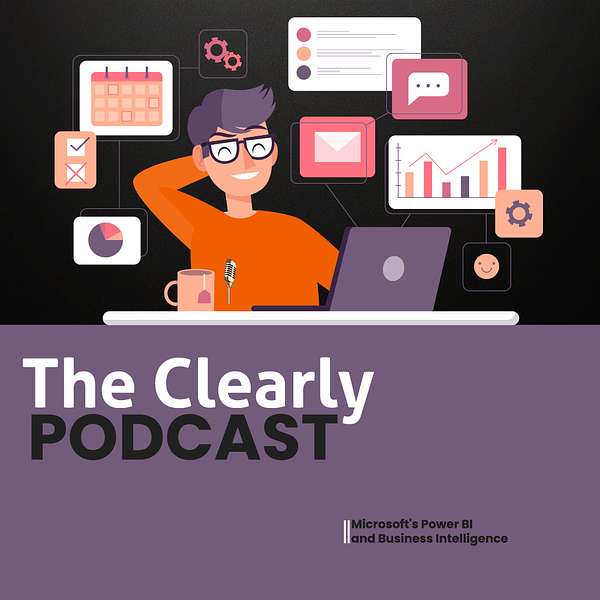
The Clearly Podcast
The Clearly Podcast
Datalake vs Dataverse vs SQL - Which one is best?
🚀 Navigating the World of Databases 🚀
In the ever-evolving terrain of data management, making informed choices about the right database technology can significantly impact your business operations and strategy. From SQL and Dataverse to Data Lakes and, funnily enough, Excel, each platform serves unique needs and applications.
In our podcast discussing this topic, we embarked on an enlightened journey through the world of databases, exploring how these technologies compare, contrast, and complement one another in the vast landscape of data management.
🔍 Key Takeaways:
SQL stands as the time-tested foundation for structured data storage and management, perfect for businesses seeking reliability and scalability.
Dataverse emerges as the user-friendly contender, designed with the non-technical user in mind, offering predefined tables and seamless integration with the Power Platform and Dynamics 365.
For handling enormous analytical workloads, Data Lakes offer a cost-effective solution, capable of storing petabytes of data in their native format.
Excel is an ironic inclusion, while most data professionals agree Excel is not a database, they’d also (probably) agree it’s the most widely used data source.
Choosing the right database technology is more than a technical decision—it's a strategic one. Whether your business requires the robustness of SQL, the accessibility of Dataverse, the analytical prowess of Data Lakes, or even the simplicity of Excel, there's a solution that fits your needs.
For a deeper understanding of these technologies and how to align them with your business goals read our latest blog post. Let's demystify the database landscape together, ensuring your data management strategy is not just effective but transformative.
https://clearlysolutions.net/blog/navigating-the-database-landscape-data-lake-sql-dataverse-and-excelnbsp
You can download Power BI Desktop from here.
If you already use Power BI, or are considering it, we strongly recommend you join your local Power BI user group here.
To find out more about our services and the help we can offer, contact us at one of the websites below:
UK and Europe: https://www.clearlycloudy.co.uk/
North America: https://clearlysolutions.net/
Andy: Welcome to our discussion on Datalake, Dataverse, and SQL. Today, we’ll explore their differences and determine which is the best choice for various scenarios.
Shailan: Let's start with a brief overview. A Data Lake is a centralized repository that allows you to store all your structured and unstructured data at any scale. You can store data as-is, without having to structure it first, and run different types of analytics—from dashboards and visualizations to big data processing, real-time analytics, and machine learning.
Tom: On the other hand, Dataverse, previously known as the Common Data Service, is a scalable data service and app platform. It allows you to securely store and manage data used by business applications. It's optimized for use with the Microsoft Power Platform and Dynamics 365.
Andy: SQL, or Structured Query Language, is a standard language for managing and manipulating databases. It’s widely used for relational database management systems (RDBMS) and is known for its reliability and ease of use for structured data.
Shailan: So, when would you choose a Data Lake over SQL or Dataverse? Data Lakes are best for large volumes of unstructured data. If you're dealing with diverse data sources and formats, a Data Lake is a great choice because it allows for raw data storage without schema requirements.
Tom: SQL is ideal for structured data and transactional systems. If you need to ensure ACID (Atomicity, Consistency, Isolation, Durability) compliance and perform complex queries, SQL databases are the way to go. They offer robust support for data integrity and efficient querying.
Andy: Dataverse shines in scenarios where you need to integrate various business applications and use the Microsoft ecosystem. It's excellent for business data management, especially if you’re leveraging Power Apps or Dynamics 365. It also provides built-in security and governance features.
Shailan: What about performance and scalability? Data Lakes are highly scalable and can handle petabytes of data. However, querying can be slower compared to SQL databases because the data is unstructured.
Tom: SQL databases are optimized for fast querying of structured data but might struggle with scalability issues as data volumes grow significantly. Dataverse offers a middle ground, with good performance for business applications and built-in scalability features.
Andy: Cost is another consideration. Data Lakes can be cost-effective for storing large amounts of data, but processing costs can add up. SQL databases might incur higher costs due to licensing and infrastructure, but they provide efficient data retrieval. Dataverse pricing depends on usage and can be cost-efficient within the Microsoft ecosystem.
Shailan: To sum up, each technology has its strengths:
- Use Data Lake for large-scale, unstructured data.
- Use SQL for structured data and transactional needs.
- Use Dataverse for integrating business applications within the Microsoft ecosystem.
Tom: The best choice depends on your specific use case, data types, and the ecosystem you're working within.
Andy: Thanks for joining our discussion. We hope this helps you decide between Data Lake, Dataverse, and SQL. Until next time!